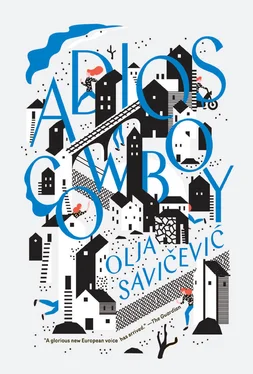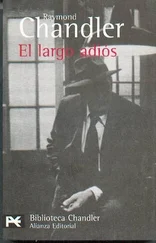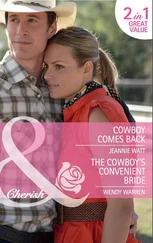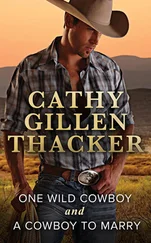Olja Savicevic
Adios, Cowboy
Stranger, the law does not protect you here.
— Graffito, Main Jetty, Split, Croatia
SUMMER 2009 CAME TOO EARLY. This meant that ferocious heat had been building up ever since the beginning of May: the spring roses were expiring in the parks and stone troughs.
At the end of July I packed all my belongings, abandoned the borrowed apartment where I had lived through several lost years and set off for home.
My sister met me in the kitchen of our old house with her suitcase already prepared for her departure. During our conversation lasting an hour and a half, she got up from the table four times, once to pour me some milk and three times to go to the bathroom. Finally she came back with her lips colored bright pink, which surprised me, but I didn’t say anything. She hadn’t used that color lipstick before. While she was talking to me, she sent several text messages, and then finally she stood up, straightened her skirt, and set off along the lengthy corridor and down the stairs. Ma was lying in her room on the lower floor, surfing channels.
They said goodbye briefly, at the front door, I heard their voices, and I watched from the balcony as my sister disappeared around the corner, behind the baker’s house. For a moment she was an unreal apparition in a real scene, a simulation. I finished the cold coffee in her cup with its smudge of pink lipstick.
Before she vanished, my sister had told me something of her daily ritual with Ma over the past month. It was precise and simple: they rose early, always at the same time, and spent at least twenty minutes over coffee. Then, before the sun was too hot, they set off on foot, one behind the other, along the main road to the cemetery. In summer, the thin strip of earth beside the road, barely wide enough for two narrow feet, turned to dust. Between the road on one side and the brambles, groundsel, and unplastered houses on the other side of an imagined pavement, dust rose up, getting into your eyes and throat and between your toes in your sandals.
“D’you know some folks eat earth?” my sister asked my mother as they trudged through the dust, beside the main road. “It’s called geophagy.”
But Ma responded tangentially, as she so often did these days: “Dust to dust, better be buried in earth than immured in concrete.”
“Death don’t bother me none,” my sister broke in. “Fuck death. You can get used to it too, I’m sure.”
“Course it don’t bother you.” Ma was offended. She shook the dust out of her clog and strode on, chin in the air, with all the dignity of a future deceased person, one step ahead of my sister.
After they had washed our grave and cut the rotted stalks off the flowers, they would make their way down to the beach with a more sprightly step.
“It’s calm and quiet as a microwave,” my sister had remarked as they passed through other people’s gardens and desiccated orchards.
At the beach, Ma took squashed pears and bananas out of the paper bag in a plastic bag in a Tupperware box and offered them, with her famous Hollywood smile (which ought to make any normal person feel a bit better, observed my sister). But she thought Ma used to just pluck that expression out of a folder or the big straw basket she toted around wherever she went. And it seemed to her that sometimes Ma would produce that smile, the ace from a sleeve of mass-produced expressions, at the wrong moment.
Their togetherness would come to an end with their return home, after lunch, when my sister would withdraw to her room upstairs till suppertime and try to get on with her own work, even though she was on holiday (she’s a schoolteacher). Ma would then feed ginger Jill, settle down in front of the television, and announce: “My serial’s starting.”
Minerva, Aaron, and Isadora had decided to investigate the true identity of Vasiona Morales. She was a very dangerous woman who had to be separated from Juan.
In Ma’s eyes all serials are important, and equally so.
She would fall asleep in front of the TV, wrapped up to her ears, although at the time the temperature didn’t fall below thirty even at night.
The day I left Zagreb, my sister told me she was terrified that Ma was going to overdo her sleeping pills — she didn’t stir under the sheet, she didn’t even breathe, just occasionally farted in her sleep.
“She’s dreadful,” Ma said of my sister after she’d left. “She says terrible things. I don’t get it, Dada.” That’s what I’m called — Dada, that’s the name my parents gave me.
When I accompany Ma to the highway, the heat rises from the earth: by seven it’s up to one’s ankles. On dry mornings, just after midday, it starts grilling down straight from the sky. In town it’s worst around five p.m. — the salt air begins to sweat and everything that moves passes limply through treacle, while the song of a million sounds is transformed into a steady, electric hum that hypnotizes.
Although she’s perfectly upright when she sits or stands, when she’s walking Ma rolls over the edges of a line. Cisterns and refrigerated-fish lorries hurtle past a few centimeters from her shoulder. Maybe there’s just no place anymore for a non-driver in traffic, I reflect.
“They should be shut up in pedestrian gulags, those idiots don’t realize their life’s on the line,” my sister said once, I think it was when we were driving in her ex-husband’s turbo off-roader to Daniel’s funeral and some kids suddenly tore across the road.
“Pedestrians have to be loved. Pedestrians created the world. And when it was all done, cars appeared,” I said. Everyone looked at me as though I was nuts. “It says that in a book somewhere,” I added.
I was sitting in the back on sticky fake leather, surrounded by wreaths of palm branches that pricked my bare arms, among arrangements of chrysanthemums and bunches of blowsy roses with big red ribbons. The wreaths had mauve ribbons and names written in gold felt-tip.
“So folks know who’s sorry,” my sister remarked, which was deemed inappropriate.
“My, but we’re primitive,” she then added, closing the window out of which she had tossed a still-lit butt the color of blood. “Things like this prove it. Every love’s weighed, see, the bigger the death notice, the bigger the advertisement, the more marble on the grave or gold on the cross. More cash, more love. Chucking money around. The more luxurious the vacuum cleaner he gives the young couple, the bigger the brother’s love, s’all the same. There’s no such thing as a poor relation, just a tight-fisted sod who doesn’t love you,” she turned to tell me.
I was sweltering among the prickly wreaths, trying not to crush the flowers and watching people picking cherries beside the cement works. They had ladders, caps, and blue aprons. They looked contented in their manual toiling. I wondered whether cement dust scattered over them as they pulled down the branches with their long-handled pincers. I remembered that dust as being like a soft carpet; it was an agreeable memory.
I didn’t answer my sister and that provoked her to keep on talking, sentences that flew like projectiles around the absence of my reply. Her former husband, a peaceable and transparent type, soft and stiff, said: “Okay, calm down, now.”
As we walk along the side of the motorway, my mother is transformed into a mole alongside a poster of a pastoral center on which is written JESUS LOVES YOU, then into an extinguished glow-worm beside the discount store and into a minus sign when moving beneath a larger-than-life-size, washed-out poster of our very own “Hero Not War Criminal,” General Gotovina. We walk on in the dust beside the road by the petrol station, on a path barely wide enough for two narrow feet. The speed limit here is sixty, but people drive at least eighty and a little further on, the four-lane fast road comes to an end and drivers lose all sense of speed. Farmers in their tractors are known to come out onto the highway from one of the un-made-up side lanes and slow the traffic down to a crawl.
Читать дальше












